By Abdullahi Ahmed Nor
Introduction
Somalia, located in the Horn of Africa, has faced decades of civil conflict, political instability, and social fragmentation. As part of the efforts to rebuild the nation, Somalia has been working towards establishing a permanent constitution. However, the country is currently facing a constitutional impasse that poses significant challenges to its progress toward stability and democracy.
This article explores into the historical context, key issues, implications, and potential pathways to addressing this constitutional deadlock.
Historical Context
Somalia’s modern constitutional journey began after the collapse of the Siad Barre regime in 1991, which plunged the country into a prolonged civil war. Various transitional governments attempted to restore order, culminating in the establishment of the Transitional Federal Government (TFG) in 2004, which introduced the Transitional Federal Charter.
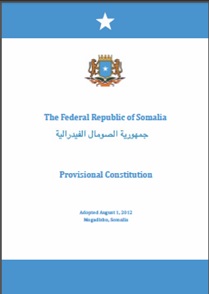
On August 01, 2012, the Provisional Federal Constitution (PFC) was adopted by constituent assembly. Of the 645 delegates present 96% voted for it, 2% against it and 2% abstained. For the constitution to come into effect, it was agreed to be ratified by the new Parliament (9). The ratification of the Provisional Federal Constitution (PFC) marked a significant step towards re-establishing Somalia’s governance framework. The PFC was designed as an interim constitution to guide the country until a permanent constitution could be ratified. Despite this progress, Somalia remains without a finalized constitution, mired in a complex political impasse.
Parliament Nine (2012 – 2016)
Parliament 9 was the first Parliament selected within Somalia (Mogadishu) by 136 elders – the tenure of Parliament nine 2012 – 2016, coincided with the first term of President Hassan.
The oversight committee of the Federal Parliament and the Independent Constitution review commission embarked on the review of the newly adopted Provisional Federal Constitution (PFC) and to that end produced towards the end of the term of Parliament nine, three versions of draft constitutions – Presidential, Parliamentarian and Hybrid draft Constitutions. The oversight committee of the Parliament and the independent constitution review commission at the time envisioned to give the Somali people the opportunity, to cherry-pick from the three samples, the one that suite their need. Unfortunately, there was no much time left to deliberate on the choices; so late Speaker Mohamed Osman Jawari had no time on his watch as the term of Parliament 9 was coming to an end, so he rightly passed the baton to Parliament 10, to deliberate and work on it.
Parliament Ten (Dec 2016 – April 2022)
The term of Parliament ten coincided during the term of President Mohamed Abdulahi Farmajo, unlike Parliament Nine (9) thanks to President Hassan, Parliament Ten members were selected from their respective Federal Member States by an electoral college of 52 members, which was a milestone in the history of post conflict Somalia. Late Prof Mohamed Osman Jawari (MP) was reelected to the office of the Speaker of the House of the People of Parliament ten. The late Speaker Mohamed Osman Jawari (MP) submitted the three draft constitution versions to the Parliament oversight Committee of the new Parliament as well as to the Independent Constitution Review Commission.
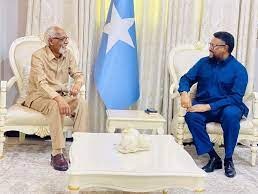
The respective Committees started working on the review of the agreed upon draft constitution, which happened to be none other than the Provisional Federal Constitution, which was the version that the Parliament ratified. Due to political tug of war, Late Speaker Mohamed Osman Jawaari (MP) resigned from office on April 2018. Mohamed Mursal Sheikh Abdirahman (MP) was elected to the office of the Speaker of the House of the People of Parliament ten.
Speaker Mohamed Mursal (MP), made his top priority to see the completion of the review of the PFC and ultimately managed the completion of PFC with the exception of several articles that needed political consensus among the Federal Member States and the Federal Government’s joint meeting of the National consultative Council (NCC). Speaker Mohamed Mursal (MP), tried his best to appeal unwaveringly to the Federal Member States and the Federal Government’s NCC to convene a single one week meeting to finalize the outstanding articles that is holding the PFC from completion but to no avail. Close to the expiration of the term of the 10th Parliament, like his predecessor, he handover the incomplete PFC to Parliament 11 with the understanding that the review of the Constitution will get completed in the first six months of the new Parliament 11 as 97% of the review was already completed.
Parliament Eleven
The term of the Eleventh Parliament, from April 2022 to April 2026, coincides with President Hassan Mohamoud’s second term. Sheikh Adan Mohamed Madoobe (MP) was elected as the Speaker of the House of the People of Parliament 11. Unlike Parliaments 9 and 10, the leadership of the Eleventh Parliament falls significantly below the minimum required educational and experience levels for such high office. Mr. Adan Madoobe and his two deputies lack formal schooling, making the leadership of Parliament 11, the least qualified among the sitting MPs. Consequently, the Somali polity views the Eleventh Parliament as dysfunctional, casting doubt on its ability to govern and address the nation’s pressing issues.
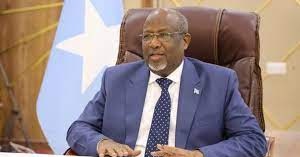
The Eleventh Parliament of Somalia stands out globally as the only parliament that ratifies treaties its members neither scrutinized nor saw, and similarly, for approving a Presidential Constitution presented without public consultation, further complicating the already turbulent Somali political landscape. Adding insult to injury, the Federal Government has entered into numerous treaties with various countries, none of which have been presented to the Parliament at the time of this writing, highlighting a significant lapse in democratic and legislative processes.
President Hassan Mohamoud took a solemn pledge to complete the review of the Provisional Federal Constitution (PFC) on the day he was reelected as President of the Federal Somalia. He didn’t mention in any way or form that he will come up with a completely new Presidential Constitution. The expectation of the elite and the masses was that he will complete the Provisional Federal Constitution (PFC) within the first six months of his term as all the review work was already done, short of the few articles pending for the political consensus of the National Consultative Council (NCC). Everyone assumed that President Hassan will have an easy ride and will take the credit of the completion of the Provisional Federal Constitution (PFC).
President Hassan, certainly disappointed most of the people by ditching the all agreed upon PFC and instead, like a magician pulled a new Presidential Constitution out of his pocket that is devoid of any form of consensus “I won’t stop for no one” is the President Hassan’s motto. The most worrying argument is who requested him to come up with this new divisive Constitution? Now Somalia is back to square one as President Hassan’s solo Presidential Constitution pulled the rug under the feet of every one at a time Somalia is craving for unity against Al Shabab, climate change effects and the Ethiopian quest for sea and land corridor of Somalia’s coastline. In place of preserving to keep the unity of the nation, the only viable Federal Member State (Puntland) severed ties with the Federal Government as a direct consequence of President Hassan’s illegal action of tossing away the all agreed upon Provisional Federal Constitution. Viable State, I mean, the only state that has undisputed control of its territories and delivers development services to its people.
President Hassan, to the surprise of many, declined an invitation from Puntland President Said Dani to discuss the constitutional stalemate. In the final months of 2023, President Hassan spent millions to undermine Puntland’s one-person-one-vote project by hiring local Puntland politicians from the Federal MPs. Furthermore, he politicized international community funds earmarked for Puntland development by withholding them to use as political leverage against President Dani. Despite President Hassan’s efforts, Puntland’s political parties agreed in June 2024 to complete the remaining three district councils in the Nugal region by August 1, 2024.
Puntland’s institutions, are more advanced than those in Mogadishu, as it has a Constitutional Court, a qualified Auditor, and a functioning government bank, and are making significant strides towards achieving real universal suffrage.
It’s not a question of if, but when the remaining Federal Member States will disown the weak Federal Government. President Hassan Mohamoud is far from a unifying leader; he travels a solitary path around the globe attending low level events and workshops, having failed miserably to garner support even from his former allies in the opposition.
Role of the International Community:
The international community has been deeply involved in Somalia’s state-building efforts, technical assistance, political mediation and providing crucial financial support without which the Somali government would have collapsed within the space of one month. Around 70% of the recurrent budget and 100% of the development budget is financed by the International Community. However, this involvement has sometimes led to tensions, with Somali stakeholders accusing international actors of imposing solutions that do not align with the local needs and realities or often turn a blind eye to problems that sets back the political development of Somalia, for instance among the many the withholding of development funds of Puntland. The international community should continue to support Somalia’s constitutional process with a focus on facilitating dialogue and providing technical assistance. Nevertheless, it is crucial that this support respects the Somali ownership of the process and is sensitive to local dynamics and priorities.
The International Community must swiftly establish platforms for dialogue and negotiation among Somali stakeholders to address the endemic corruption and constitutional crises perpetuated by the current president, whose control is limited to a few districts of Mogadishu. Proactive intervention can curb these issues early on and potentially save the International Community significant funds in the future. Utilizing its considerable leverage, the International Community is expected to prevent the current president from further disintegrating Somalia, already in a fragile state.
Key Issues in the Constitutional Impasse- Federalism and power distribution
The constitutional impasse has significant implications for Somalia’s futurePolitical Instability. Without a clear and agreed-upon constitutional framework, political disputes continue to arise, perpetuating instability and undermining efforts to build a cohesive state. Political uncertainty deters domestic and foreign investment, stalling economic growth and development initiatives. The absence of a robust legal framework hampers efforts to protect human rights and establish the rule of law, leading to ongoing impunity and injustice.
A central issue in the constitutional debate is the distribution of power between the federal government and the federal member states. The PFC outlines a federal system, but specifics regarding the extent of autonomy, resource allocation, fiscal federation, and responsibilities between the central and regional governments remain contentious. This lack of clarity has led to disputes and hindered the effective functioning of federalism.
Ongoing insecurity, primarily due to the presence of Al-Shabaab and other militant groups, severely impacts the constitutional process. These groups disrupt political activities and undermine state authority, making it difficult to conduct inclusive dialogues and peaceful negotiations. Additionally, weak governance structures, rampant corruption, and inefficiency further impede the progress.
Prospects for Resolution
Addressing Somalia’s constitutional impasse requires a comprehensive and multifaceted approach. Achieving consensus through inclusive dialogue is essential. This process must involve all stakeholders, including federal and regional governments, political parties, civil society, and marginalized groups. A genuine commitment to compromise and consensus-building is crucial for success.
Building strong, transparent, and accountable institutions is vital for implementing any constitutional framework. Efforts to combat corruption, enhance governance, and improve public service delivery should be prioritized to build public trust and ensure effective governance.
Improving security is a prerequisite for any political progress. This involves not only military efforts to counter Al-Shabaab and other threats but also initiatives to build local security capacities and promote community-based approaches to security.
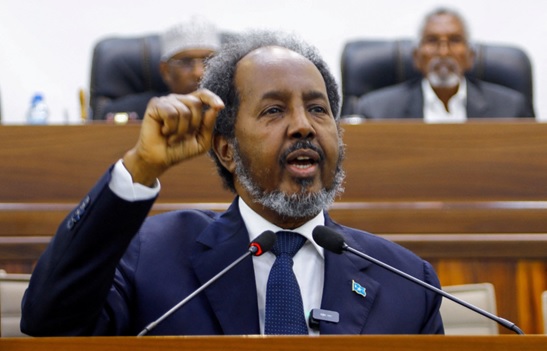
The 4.5 power-sharing formula, which allocates political positions based on clan representation, has been a cornerstone of Somalia’s political framework. However, it has been criticized for perpetuating clan divisions and marginalizing minority groups. The debate continues over whether to maintain, reform, or replace this formula, with minority faction advocating for more inclusive and representative systems but in reality, the security challenges and the political state of affairs won’t allow for one person one vote to see the light of the day.
The single constituency approach failed to work for President Mohamed Abdullahi Farmajo due to the sabotage of President Hassan and certainly it won’t work this time for President Hassan either who aborted the first Federal Member State (Puntland) that stepped into implementing the universal suffrage.
Conclusion
Somalia’s constitutional impasse is a complex challenge with far-reaching implications for the country’s stability and development. Overcoming this deadlock requires a concerted effort involving inclusive dialogue, institutional strengthening, enhanced security, and sensitive international support.
Moreover, focusing on combating corruption and strengthening institutional frameworks is crucial. The international community’s support, through diplomatic pressure and conditional aid, can play a pivotal role in guiding Somalia towards stability and sustainable development. By addressing these issues holistically, Somalia can move towards a permanent constitutional framework that provides a foundation for lasting peace, stability, and prosperity for all its citizens.
By embracing these principles, the country can steer away from the current leadership failure, dysfunctions, further fragmentation and towards a future of peace and progress.
Abdullahi Ahmed Nor
Email: abdullahinor123@gmail.com
————-
Related articles:
1) Betrayed by leadership By Ahmed Ibrahim Ph.D.
2) Somalia’s desperate hour: The fight against president Hassan Sheikh’s failed leadership By M. Fatah
3) Open Letter: Urgent appeal for the continuation of the United Nations Assistance Mission to Somalia (UNSOM) By Mohamed Fatah
4) Hassan Sheikh Mohamud’s legacy: A tale of corruption By Abdullahi A.
5) Unraveling the political maneuvers: The failed NCC meeting By Abdullahi Ahmed
6) Reflections and analysis on Parliament amended constitutional chapters By Osman H Yusuf
7)Tensions rise amidst constitutional crisis in Somalia and the Ethiopian territorial ambitions By A. A. Nor
8) Somalia on the brink of authoritarianism By Dayib Ahmed
9) The conundrum of the Somali constitution By Abdullahi A. Nor
10) Somalia on a dangerous precipice By Abdelkarim A Haji Hassan
11) Somalia eroding governance: The case of President Hassan’s second term By Dayib Ahmed
12) An open letter to the us dep of state: urgent action needed to safeguard democracy and rule of law in Somalia By Mohamed Fatah
13) President Hassan Sh. Mohamud: The veil of corruption and family centric administration By Ahmed I
14) An open letter to President Sheikh: Urgent call for national unity By Mohamed Ali

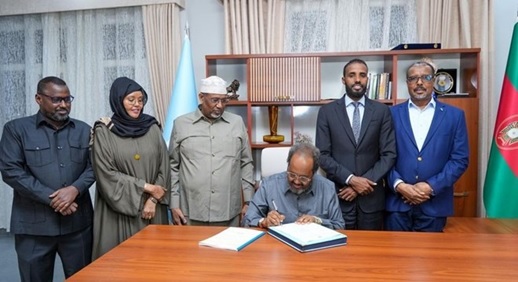
Leave a Reply